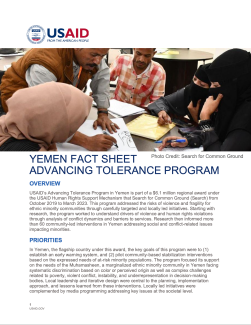USAID’s Advancing Tolerance Program in Yemen is part of a $6.1 million regional award under the Human Rights Support Mechanism implemented by Search for Common Ground (Search) from October 2019 to March 2023. This program addressed the risks of violence and fragility for ethnic minority communities through carefully targeted and locally led initiatives. Starting with research, the program worked to understand drivers of violence and human rights violations through analysis of conflict dynamics and barriers to services. Research then informed more than 60 community-led interventions in Yemen addressing social and conflict-related issues impacting minorities.
KEY RESULTS
- Empowered 120 community leaders from minority and majority communities to organize over 60 community interventions in Aden, Taiz, and Ad-Dahle, addressing key issues such as discrimination, human rights violations, community conflict, and local development challenges.
- The Early Warning Early Response System (EWERS) pilot established in Aden supported community leaders on a rolling basis to collect important information about risks to ethnic minority communities, analyze the data, and develop responses to the various threats identified. In total, eight interventions addressed neighborhood crime, community tensions, safety hazards such as electrical fires, and increased safeguards against sexual abuse in schools. These responses also strengthened coordination between displaced communities and decision makers.
- Tackling the issue of elevated crime and insecurity in poorly lit Muhamasheen communities, the program supported the installation of solar-powered street lamps in Aden, serving 6,200 households, and solar street lights for an additional 350 families in Taiz. As a result, community members reported reduced levels of crime and increased security, especially for women.
- Women often face discrimination and abuse while fetching water outside their communities. Women who identify as a member of a minority group face additional discrimination and abuse. To address this, USAID supported local leaders to install water systems, bringing running water to approximately 400 households in Aden. As a result, fewer women traveled to other communities, risking exposure to violence and abuse.
- Sewage systems in disrepair negatively affect the health and well-being of many communities in Yemen, and the lack of system maintenance often perpetuates cycles of blame, discrimination, and inter-community tension. Matters of cleanliness have been used as rhetoric for prejudicial mistreatment. This program supported community leaders to rehabilitate the local sewage system, renewing sewage access for 260 families in Aden. Community leaders reported reduced tensions as a result.
- Women and children are often the most disaffected amongst Muhamasheen communities in Yemen. In Taiz, USAID supported the rehabilitation of a ‘Safe Center for Women and Children,’ and provided training to staff to strengthen fundraising, youth engagement, and empowerment initiatives for 237 children and 50 women.
- Misinformation and divisive narratives often lead to negative perceptions and discrimination towards Muhamasheen, resulting in rights abuses and violence. Aimed at highlighting key issues and shifting perceptions, the USAID-funded program developed high quality radio and video products that were shared and broadcast over 2,500 times throughout southern Yemen.


